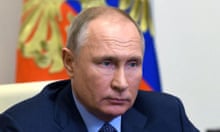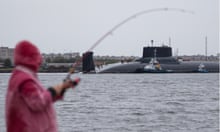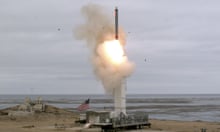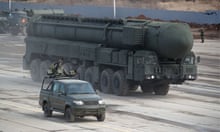Donald Trump has told Vladimir Putin he does not want to renew a 2010 arms control treaty that limits the number of strategic nuclear weapons the US and Russia can deploy.
Trump angrily denounced the New Start treaty in a 28 January phone call to the Russian leader, according to sources briefed on the call. Reuters, which first reported Trump’s remarks, said the new US president also had to pause the hour-long call to ask what the New Start treaty was.
The White House spokesman, Sean Spicer, confirmed that the call was paused but said it was because the president wanted to solicit the views of his aides.
“It wasn’t like he didn’t know what was being said,” Spicer said. “He wanted an opinion on something.”
He did not give any further details, describing the hour-long conversation as a “private call”. The Kremlin had previously characterised it as a friendly discussion in which “both sides demonstrated a mood for active, joint work on stabilizing and developing Russian-American cooperation”.
According to accounts of the conversation given to the Guardian, the phone call began with a friendly exchange, with both leaders stressing their own popularity and complimenting each other on their domestic support. Then when Putin brought up two issues on which their countries had cooperated on, New Start and the 2015 nuclear deal with Iran, Trump lost his temper, dismissing both as strategic losses for the US given away by Barack Obama, and he began hectoring Putin.
The New Start treaty, agreed between Obama and the then Russian president Dmitry Medvedev, obliges both countries to reduce their strategic arsenals, including land-based intercontinental ballistic missiles, submarine-launched missiles and long-range bombers to 1,550 warheads each by 2018. There are also limits on the number of missile launchers each side can have.
A clause in the treaty allows the agreement to be extended by up to five years by mutual agreement. According to the Reuters report, it was when Putin raised the possibility of extension, that Trump paused the call to ask about the treaty, and then returned to the conversation with a tirade against the agreement.
Thomas Countryman, former assistant secretary of state for international security and nonproliferation, said he had raised the possibility of New Start’s extension last month with his Russian counterpart, deputy foreign minister, Sergei Ryabkov.
“Both capitals have known that the extension of the treaty … would be an easy win-win that could set a new tone for relations between the two countries,” said Countryman. ”I’m deeply disturbed that the president was not just neutral on the question, not just negative – saying not right now – but actually seemed to take a step backward in calling into question an agreement that is beneficial to both sides and has been implemented faithfully by both sides.”
Countryman was suddenly removed from his position at the end of last month while on his way to a nuclear weapons conference in Rome, as part of a purge of senior state department officials who have yet to be replaced, leaving the department’s senior ranks seriously depleted.
Countryman said he had no first-hand knowledge of the tone or content of the Putin call, but said it was “ominous” if the president had not been fully briefed on New Start before talking to the Russian leader.
“If it is all going to be seat-of-the-pants – ‘last time I looked on Twitter’ –rather than pursuing a carefully prepared agenda, that’s disturbing,” Countryman said.

Both before and after his election victory, Trump has made dramatically contradictory statements on the US nuclear arsenal. He denounced the agreement, which he referred to as “Start Up” in a presidential debate in October, wrongly claiming that it meant Russia could “create warheads and we can’t”.
In December, he tweeted that the US should “expand its nuclear capability” and told a reporter: “Let it be an arms race.”
In an interview shortly before inauguration, however, he appeared to offer deep bilateral cuts in nuclear arsenals accompanied by sanctions relief for Moscow, saying: “I think nuclear weapons should be way down and reduced very substantially.”
Joseph Cirincione, the head of the disarmament advocacy group, the Ploughshares Fund, said Trump was “tripping up over his own narcissism. He is letting his personal prejudices get in the way of his strategic goal. He is picking a fight with Putin who he wants better relations with.”
New Start was approved by the Senate and has the overwhelming support of the US military establishment, including seven past commanders of US nuclear forces. But it has critics on the right wing of the Republican party and some US conservatives.
“There are a lot of critics that say that New Start really got the US nothing and it allowed the Russians free space to grow their strategic nuclear deterrent,” James Jay Carafano, a national security and foreign policy analyst at the Heritage Foundation.
Steven Pifer, a former senior state department official, argued that if the US walked out of New Start now, it would give Russia a strategic advantage as it already has functioning production lines producing new nuclear weapons to replace the old.
Pifer, now at the Brookings institution, said the report suggested Trump “really doesn’t have a good understanding of nuclear balance between Russia and the United States”.
Countryman said he feared that if arms control broke down between Washington and Moscow, it could pave the way to an accelerated arms race.
“The Obama administration was frustrated we were not able to move forward with the Russian Federation on logical next steps in arms control,” he said. “But we didn’t move backwards, and I am very concerned that now we are.”









